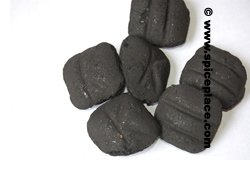 When asked what charcoal is, many folks would describe Kingsford charcoal or the knock offs of Kingsford. Kingsford is a fine quality charcoal, and is made with hardwoods, ground, then bound together and pressed into briquets. Kingsford’s origin comes from the Ford Motor Company, and the product was created to find a use for all of the scrap lumber from the production of Ford Automobiles. We use Kingsford all of the time, and don’t bother with the knock-offs as we find the knock-offs are inferior to Kingsford.
When asked what charcoal is, many folks would describe Kingsford charcoal or the knock offs of Kingsford. Kingsford is a fine quality charcoal, and is made with hardwoods, ground, then bound together and pressed into briquets. Kingsford’s origin comes from the Ford Motor Company, and the product was created to find a use for all of the scrap lumber from the production of Ford Automobiles. We use Kingsford all of the time, and don’t bother with the knock-offs as we find the knock-offs are inferior to Kingsford.
But Kingsford isn’t the only charcoal on the market that’s worth cooking on. There is also a variety of charcoal known as lump charcoal. The brand we have a picture of here is Cowboy Brand, but there are other brands as well. 10 years ago or so, you had to go to a roofing supplier like The Roof Center to get lump charcoal. This type of charcoal is used by the folks that solder copper gutters together because of it’s quick lighting and hot temperature. Lump charcoal is light in weight — almost feather like compared with charcoal briquets.

The choice of whether to use Kingsford charcoal briquets or lump charcoal depends on what you’re cooking, how long the cooking time is, and whether your grill has a way to easily add more charcoal. Since the lump charcoal lights fast, cooks hotter, and burns faster, it’s the choice charcoal for cooking fairly fast cooking foods like hamburgers, steaks, and hot dogs. It’s easy to light including in windy locations such as on the beach. But since lump charcoal burns faster then the Kingsford briquets, you’ll need to add more fuel to your grill if you’re trying to cook something longer cooking such as a roast or ribs. So we choose lump charcoal for the burgers, hot dogs, and steaks; Kingsford briquets are our choice for the beef roasts, chicken, and pork butts.
So as you’re planning your barbeque cooking, there’s more to consider then simply what to cook, there’s a choice of the type of charcoal to use as well. In the US, you can find lump charcoal in season at Trader Joe’s stores, and at roofing supply wholesalers like The Roof Center.